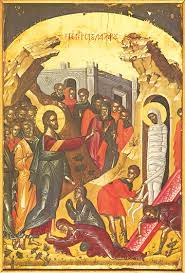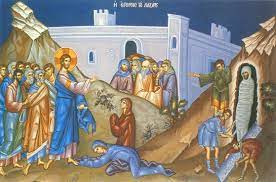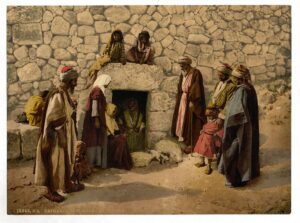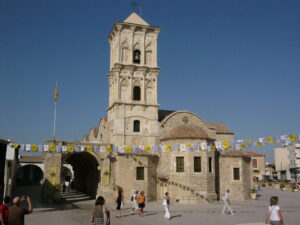The Saturday of the Raising of Lazarus
from the Arabic Tone 6, by Metropolitan Athanasios Atallah of Homs – arranged by His Grace Bishop Basil of the Antiochian Diocese of Wichita and Mid-America (Orthodox Christian Chants site)
Epistle: Hebrews 12:28-29; 13:1-8
1 “Jesus Christ is the same yesterday and today and for ever.” Despite all that happens or ever happened or ever will happen, His kingdom is unshakable. Not even death could destroy it.
2 “Let brotherly love continue.” “Do not neglect to show hospitality to strangers, for thereby some have entertained angels unawares.” Martha and Mary and their brother Lazarus showed hospitality to Jesus. When He was in Judaea He stayed at their house in Bethany *, as He would a final time during Holy Week. Little did they imagine they were entertaining God unawares!
- about two miles from Jerusalem, on the eastern slope of the Mount of Olives, today a bustling Palestinian city of 22,000
Who knows what graces we turn away when we fail to be hospitable? (Consider something as simple as ignoring visitors at church.) If they had not been hospitable, friends of Jesus, would Lazarus have been raised? Would Martha and Mary have been among the first to see the Risen Lord?
Holy Gospel: John 11:1-45
The raising of Lazarus took place actually some time before Palm Sunday, on a previous trip to Bethany. Christ was across the Jordan when messengers came from Mary and Martha saying, “Lord, he whom you love is ill.” Jesus waited before going to Judaea. His disciples were more than perplexed by this, though they did understand that His life would be in danger in Judaea. When the Lord finally said He would go to Lazarus, Thomas cried, “Let us also go that we may die with Him”. He is no “doubting Thomas” here!

When they arrived, Lazarus had been dead and in the tomb four days. Custom (for very practical reasons) was to bury the dead by sunset the day they died. Martha the ever-active one ran to meet Jesus, with both faith and accusation. “Lord, if You had been here my brother would not have died.”
Disappointment, even anger with God, is often a sign of faith. Lord, I believe You could have done it. Why didn’t You?
The world today is in such a mess. So many people suffering and dying needlessly before their time. It feels like everywhere everything is headed in the wrong direction. “Lord, if only You were here…”
Jesus answered in words that have rung through the centuries: “I am the resurrection and the life. He who believes in Me, though he die, he shall live. Whoever lives and believes in Me shall never die.”
“Shall never die.” Beginning with the New Testament, Christians often speak not of death but of “fallíng asleep” (kimissis, κίμισσις). Death to the believer is not dying: We fall asleep on this side with Christ and wake up on the other, still with Christ.
Mary, the contemplative one, said the same as Martha: “Lord, if You had been here my brother would not have died.” And so it is with us: Christ has conquered death. He promised to be with us “to the end of the age”. So why does He still let us die? Why must I die? Why is the world still what it is? Why?
Jesus went to the tomb and saw them all weeping. John says He “groaned in spirit”. And then “Jesus wept”.
Only twice is it written that He wept. He wept now at the tomb of Lazarus. And also at another “death” He foresaw: “Now as He drew near, He saw the city [Jerusalem] and wept over it, saying, ‘If you had known, even you, especially in this your day, the things that make for your peace! But now they are hidden from your eyes. For the days will come upon you when your enemies will build an embankment around you, surround you and close you in on every side, and level you, and your children within you, to the ground; and they will not leave in you one stone upon another, because you did not know the time of your visitation.”: Luke 19:41-44
What He had known would happen was finally happening: His people were rejecting Him.
Why did Jesus weep today? I think because He “so loved the world”. The suffering and despair and hopelessness of mankind – today of Mary and Martha – was almost too much for Him to bear. Though soon He would bear it for us.
And I’ve always wondered (I don’t know, but I’ve wondered) if He wept also for himself. He so loved the world He had made. He loved being here with His dear Mother, and He loved sharing life – friendship, meals, fellowship – with His disciples whom He loved. He saw the anguish His death would cause them – and especially to her, for she alone knew Who He is and what His death would seem to mean: the end of all hope.
And also He saw before Him His own suffering: the inner agony that lay ahead of Him in Gethsemane, and then His death in the most excruciating way. Did He groan and weep over that too? because this was going to be hard, very hard. He would sweat blood in Gethsemane. For He was not only God; He was also Man, fully human. Sometimes people forget that.

“See how He loved him”, the people said.
“Still groaning in Himself”, John says, He came to the tomb: “Take away the stone!” Martha said, “Lord, he has been there four days, there will be corruption” = literally “a very bad smell”. Jesus said, “Now you will see the glory of God.” He prayed. Then He cried, out “Lazarus, come out!”
Lazarus came out bound in his grave-clothes, his face wrapped in a cloth. “Loose him, let him go.” A sign, a prefiguring, an assurance of our general Resurrection at the end of the age.

Lazarus’ second life on earth
Lazarus’ first tomb near Bethany (now called Al Eizaryia), is a place of pilgrimage to this day.

He then went to Cyprus where he founded the first church and became bishop. His second tomb – he died a second time! but this time without fear – was long said to be at Larnaca on Cyprus. And sure enough, in 890 it was discovered beneath Agios Lazaros (Saint Lazarus) Church there, bearing the inscription “Lazaros Four Days Dead, the Friend of Christ”. (What a beautiful title!)
In 1972, during a renovation of the church, more of his relics were discovered beneath the altar. Lazarus – now waiting with us for the general resurrection, his second resurrection.
Life can sometimes be dark like Holy Week, and we know that at the end of our lives, unless Christ returns soon, all of us will die like Lazarus. (In my case, He’d better move fast. My time on earth is running out.)
 So we will never despair, the Church gives us this blessed Week, which is introduced with the raising of Lazarus, our assurance that Christ can raise the dead.
So we will never despair, the Church gives us this blessed Week, which is introduced with the raising of Lazarus, our assurance that Christ can raise the dead.
The Week will end with an even greater assurance: the Resurrection of Christ Himself from the dead. “Jesus Christ is the same yesterday and today and for ever.”
This is why generation after generation of Christians have died in peace, with a sure and certain hope of new life in Jesus Christ. He has saved us even now from the fear of death. Later He will save us from death itself.
“Do not be amazed at this, for the time is coming when all who are in their graves will hear His voice and come out…” John 5:29-30
When we die, we die with Christ. After we die we will live with Christ. And at the End of all things you and I will hear His voice call out to us, as He called to Lazarus, “Come out!” – and we also will see the glory of God.
Next Post will arrive later today (Friday), covering: 1) How to keep Holy Week and 2) Saturday evening: Vespers of Palm Sunday